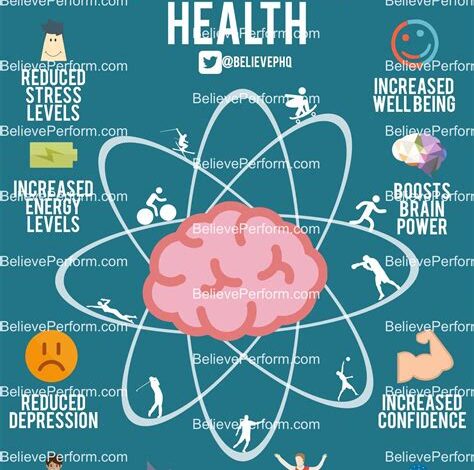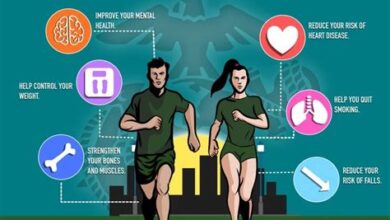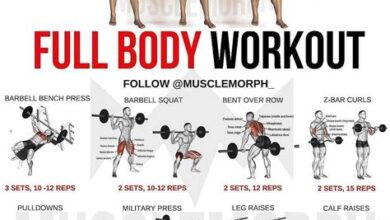The Role of Mental Health in Physical Fitness

Discover the crucial link between mental and physical health, overcome psychological barriers, and integrate mental well-being into your fitness routine for a holistic approach to wellness.When it comes to physical fitness, we often focus on the body – what we eat, how we exercise, and the visible results we hope to achieve. However, we often overlook the crucial role that mental health plays in our overall well-being. The mind-body connection is a powerful force that impacts our physical health in ways we may not even realize. In this post, we’ll explore the impact of mental well-being on our physical health, the psychological barriers that can hinder our fitness goals, and how incorporating mental health into our workout regimens can lead to a more holistic approach to health. By understanding the intricate relationship between our mental and physical well-being, we can unlock a whole new level of fitness and wellness benefits. Join us as we delve into the benefits of taking a more comprehensive approach to health and explore the ways in which mental health can be integrated into our fitness journeys.
Understanding the Mind-Body Connection
The Role of Mental Health in Physical Fitness
The mind-body connection refers to the link between our thoughts, emotions, and mental well-being, and how they can impact our physical health. This connection highlights the fact that our mental state can directly affect our physical well-being, and vice versa. When we are stressed or anxious, our body responds by releasing stress hormones such as cortisol, which can have negative effects on our physical health. On the other hand, when we are in a positive and relaxed state of mind, our body responds with lower levels of stress hormones and a stronger immune system.
This connection also plays a crucial role in physical fitness and exercise. Our mental state can greatly impact our motivation, energy levels, and ability to push through physical challenges. For example, someone struggling with depression may find it difficult to muster the motivation to exercise, leading to a sedentary lifestyle and poorer physical health. Conversely, someone with a positive mindset and good mental well-being may be more likely to engage in regular physical activity, leading to improved physical health and fitness.
Understanding the mind-body connection is essential for promoting overall well-being and achieving optimal physical fitness. By acknowledging the impact of mental health on our physical health and fitness goals, we can take steps to improve our mental well-being, which in turn can positively influence our physical well-being. Incorporating practices such as mindfulness, meditation, and stress-reducing activities into our fitness regimens can help us achieve a more balanced and holistic approach to our health.
Impact of Mental Well-being on Physical Health
It’s well-established that physical health and mental well-being are closely intertwined. The state of our mental health can have a significant impact on our physical well-being. Poor mental health can lead to a range of physical health issues, from increased risk of chronic conditions such as heart disease and diabetes to impaired immune function and slower recovery from illness or injury. Chronic stress, anxiety, and depression can also take a toll on our bodies, affecting everything from our sleep and appetite to our energy levels and overall vitality.
Conversely, prioritizing mental well-being can have a positive impact on our physical health. Engaging in activities that promote mental health, such as meditation, mindfulness, and therapy, can help reduce stress, improve mood, and enhance overall psychological resilience. These benefits can extend to our physical health, leading to lower blood pressure, improved cardiovascular function, and a stronger immune system. Additionally, a healthy mindset can foster healthier behaviors, such as regular exercise, balanced nutrition, and optimal sleep habits.
Recognizing the impact of mental well-being on physical health is crucial for taking a holistic approach to wellness. By addressing both our mental and physical needs, we can cultivate a more balanced and resilient foundation for overall health and well-being. Incorporating strategies to support mental health alongside traditional approaches to physical fitness can lead to a more sustainable and comprehensive approach to our health journey.
Psychological Barriers to Achieving Fitness Goals
When it comes to achieving fitness goals, many people focus solely on the physical aspect of their journey. However, the role of mental health in achieving these goals is often overlooked. Psychological barriers can play a significant role in hindering progress and preventing individuals from reaching their fitness goals.
One common psychological barrier is self-doubt. Negative self-talk and an internal belief that one is not capable of achieving their goals can be a major roadblock. Additionally, fear of failure can prevent individuals from even attempting to pursue their fitness goals. This fear can manifest as a lack of motivation, reluctance to try new things, and a constant feeling of being stuck in a comfort zone.
Another psychological barrier is stress and anxiety. The demands of daily life can take a toll on mental well-being, making it difficult for individuals to prioritize their fitness goals. Stress and anxiety can lead to emotional eating, poor sleep patterns, and a lack of energy, all of which can hinder progress towards physical fitness.
Incorporating Mental Health into Workout Regimens
When it comes to maintaining physical fitness, many people focus solely on the physical aspect of their training. However, the mind-body connection is an integral part of overall health and wellness. It’s important to recognize that mental health plays a crucial role in physical fitness and incorporating mental health into workout regimens is essential for a holistic approach to health.
Psychological barriers can often be a hindrance to achieving fitness goals. Stress, anxiety, and depression can all impact an individual’s motivation to exercise and maintain a healthy lifestyle. By prioritizing mental health alongside physical health, individuals can create a more sustainable and enjoyable workout routine. This can lead to long-term success in achieving and maintaining physical fitness goals.
One way to incorporate mental health into workout regimens is to focus on activities that promote both physical and mental well-being, such as yoga and mindfulness exercises. These types of workouts not only improve flexibility and strength, but also help to reduce stress and improve mental clarity. Additionally, incorporating rest days and recovery practices into a workout routine can help prevent burnout and promote overall mental wellness.
Benefits of a Holistic Approach to Health
Maintaining a holistic approach to health involves taking care of not just the physical body, but also the mind and spirit. By addressing all aspects of health, individuals can experience a range of benefits that contribute to overall well-being.
One benefit of a holistic approach to health is the promotion of balance and harmony within the body. This means that all the systems within the body are working together in sync, creating a state of equilibrium. This balance can help prevent the development of chronic conditions and improve overall physical health.
Additionally, a holistic approach to health can reduce stress and anxiety, which are known to have negative impacts on physical health. By incorporating practices such as meditation, mindfulness, and therapy into a holistic health plan, individuals can experience improved mental well-being, leading to enhanced physical health and vitality.





